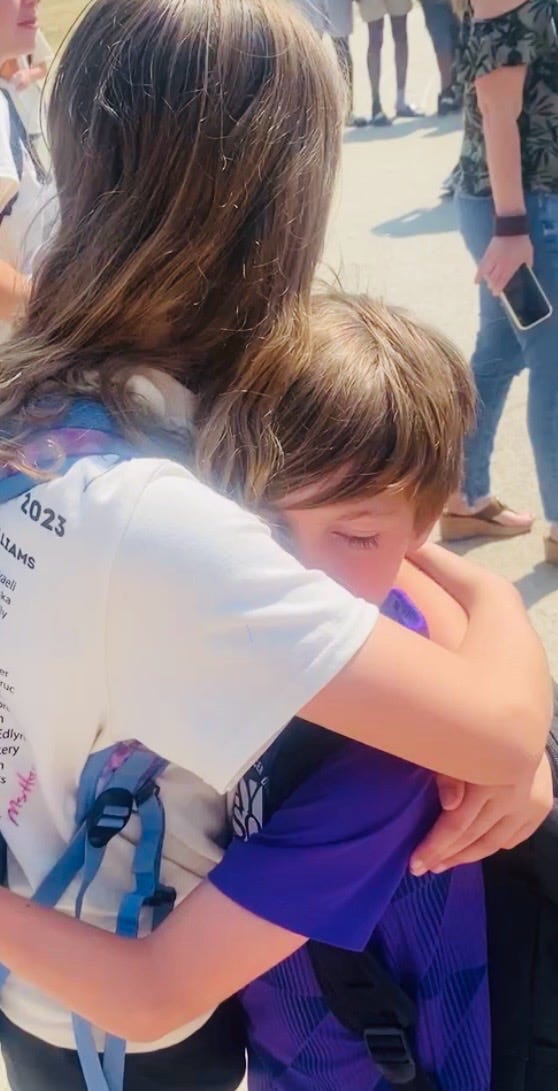Hugging Without Talking: How to Support without Taking Over
Autonomy-Supportive Parenting Diaries
A year and a half ago, I couldn't write about what happened to my daughter—it was too raw and we both needed time to recover. Now that I've shared that story ("Are We Allowing Coaches in Youth Sports to Abuse Our Children?"), I'm re-publishing this piece about what the experience reminded me of in a visceral way: building our children's emotional resilience starts with managing our own.
When I asked the insightful nine-year-old sitting in front me in my office what helps her feel better after her angry outbursts, she said, “my sister talks to me and says things that help, and sometimes she hugs me without saying anything and that helps the most.”
She had no idea how much I needed to hear that.
The night before, my husband and I had been comforting our daughter, who is going through the toughest experience she has faced in her twelve years. She sobbed and sobbed. Her father held her and said, “we don’t need to talk. I’m good at hugging in silence.” It may have been a gentle prodding for me to zip it.
I have realized I can’t stop talking when my kids are upset.
Our sensitive sixth grader is processing two of life’s toughest lessons: adults can fail to protect children and the people doing wrong can get away with it. It’s not fair but sometimes Voldemort beats Harry Potter. Kylo Ren vanquishes Han Solo. The dark side wins.
It’s painful to watch our daughter digest this reality because of how oppositely she has existed in the world. This laughter-filled, affectionate child has always seemed to float through life with ease, the sweetest of spirits, a source of light for everyone around her.
It has taken concerted effort to make sure I allow the possibility that she too has struggle (compared to her siblings who put their struggles front and center, brightly spotlighted for mom and dad to notice and respond to). People often attribute her easygoing nature to her position as middle child, which I’m not arguing, but she has exuded this essence since her first days, smiling and calm even as a baby.
This is why it’s especially excruciating to see powers beyond my control dimming this light, triggering a fear that it could be extinguished.
I have done what I can to advocate for my daughter and challenge the wrong. Even if these efforts pay off, though, the damage has been done. The veil of innocence has been lifted and my sweet baby knows the darkness. I worry it’s too much for her. I worry she’ll lose who she is, has always been, because of this unveiling.
Enter Control
Why am I writing this in a newsletter supposedly about autonomy-supportive parenting? Because this situation has tested what I regularly preach. This heavy worry about the impact of this life event on my child has brought out some intense controlling impulses.
Since I wasn’t able to control what happened, I want to control what happens next. I want to control that she rebounds from this, that she proves resilient.
My book has a chapter about building emotional resilience through autonomy-supportive practices. The foundation of doing so involves building what psychologists call “distress tolerance,” the skill of feeling discomfort rather than escaping it.
This is where modern parents often go astray to become too involved and controlling — from a place of love. The problem isn’t that parents love their children too much, it’s that they feel their children’s feelings too much. Empathy overdrive.
When this happens, we want to do what it takes to help our child feel better so we can feel better.
I can know this, write about it, and counsel other parents on it. But truth be told, it’s my greatest challenge. I feel my kids’ feelings so hard. So deep. I’m great at emotional boundaries at work after being a therapist for almost half of my life, but I’m not so great at home.
You may wonder where is the harm in having empathy for our kids – isn’t that what we’re supposed to do? Yes — with boundaries between our emotions and their emotions. Here’s why.
Making it About Us
When we take on our child’s emotions as ours, we risk taking over their problem as ours, too. I realized that my outrage about my child’s situation could eclipse her experience. I want to rant and rave with her about the injustice of it all, but that may cross the line from supporting and validating her to making it about me. So I have saved the ranting and raving to share with my husband, making more space for my daughter to own her outrage.
Pressure to Be Better
Because I want all of us to feel better, I have noticed the urge to impose my coping style onto my daughter. When I face overwhelming stress, I use my lifetime of practiced skills to move forward. I’m an optimist to the bone – immediately taking a larger perspective that helps me feel better. I journal. I talk to friends. I meditate. I DO a lot.
In my attempts to be supportive, I’ve caught my impulse to tell my child to do all these things and to think optimistically. But I have stopped myself (mostly), because I realize that what might seem helpful could actually create pressure. She could interpret my suggestions of what to do to feel better as pressure to be done being upset. (She also already knows all of these suggestions from living with me her whole life.)
Through using these skills myself during this painful time — journaling, talking to my husband and friends, and meditating — I uncovered the truth of what’s happening inside of me: I do want her to be done being upset so I know she’s okay.
I desperately want her to be okay.
Pretending and Disconnecting
If I don’t keep that maternal protective instinct in check, however, she will sense it. She will take from this that she can’t express herself too much or it’s too much for her mother. She will learn that she has to pretend to be okay so I’m okay. That is the opposite of emotional resilience. I see it in my therapy practice. This intuitive sensing of the need to protect their parents is one driving force for kids withholding from their parents, creating distance and miscommunication.
Letting Them Hurt
We fall into this trap because we love our children so fiercely. Their pain hurts us so we need them to stop hurting. But we need to let them hurt. They need to learn they can feel the pain and get to the other side. That is emotional resilience.
Summoning my self-awareness from deep within, I have worked on showing I’m there for my daughter’s struggle without pressure. No pressure to talk about the situation. No pressure to solve it. No pressure to feel better. Just there, for what she needs in the moment.
My sweet and sensitive child has opened up and sought my support, at her pace. Even when she starts talking over our bowl of homemade popcorn, I have to stop myself from taking the conversation lead. I follow her where she wants to go and pay attention to what she’s communicating she needs from me.
I don’t have a happy ending. We’re still in it. Correction—she’s still in it. It’s hers, not mine. But I can at least hug her silently through it. If I remind myself to stay quiet.
In the Media
I had the absolute pleasure of being a guest on a new venture from Senior Global Leader at Google, Stephanie Wong, who has a new podcast/YouTube series, In Real Life. Our episode, How to raise competent, confident kids without burning yourself out, lives up to the theme by being real about parenting in this current climate of impossible ideals, overwhelming stress, and constant pressure. It was a joy to talk with her!
I participated in a lively roundtable, Rethinking Boys, on the Life’s Dirty Little Secrets podcast, which came out while I was gone. Hosts and fellow psychologists, Emma Waddington and Chris McCurry, led a fascinating discussion on the challenges and opportunities of raising boys in our modern world. I was quite honored to join experts Nike Oruh, Ana Waddington, and
.Finally, writing colleague
included my strong opinions in her excellent article, From the Sidelines: Parents and Youth Sports. Perfect timing with my most recent Substack!How I’ve Been Relaxing
This installment of “How I’ve Been Relaxing” surpasses all others and will never be replicated. I spent a week in the most beautiful place I’ve ever been, the majestic island of Kauai.
I removed email from my phone, barely checked social media, inhaled the ocean air, and memorized the sight of the lush green mountains surrounding us - including off of our balcony. Did we find family nirvana? No. The sibling bickering and teen moodiness followed us, but it rolled off of me as I could shift focus to the awe of beach sunsets and morning rainbows. And we had exhilirating shared adventures (cliff jumping, swimming under a waterfall, snorkeling), fun family dinners and unforgettable bonding during a quite unnerving tsunami warning.




Alas, we had to return to normal life in Chicago where Lake Michigan is pretty, but no match for the sandy, sparkling Kauai beaches. It’s been an adjustment to replace emerald mountains with skyscrapers. But I plan to keep the aloha spirit alive as long as possible . . . although it is back-to-school season.
We’ll talk about that next time. Give me my few more days of summer!
In parenting solidarity,
Emily




Love this!
Emily, this piece really spoke to me. Looking back at raising my boys, I see how I sometimes tried so hard to protect them from pain that they learned to hide their feelings to keep me from worrying. Now that they are grown, I understand how important it is to let children feel, even when it hurts, so they can build true emotional resilience. Reading this reminded me of both the mistakes and the ways we can repair and reflect. Thank you for putting this into words so beautifully.